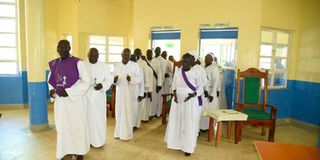
Britain's King Charles III looks on as he takes part in an oak tree planting ceremony to commemorate the visit in the garden of the British Ambassador's residence in Paris on September 20, 2023.
| AFPWest Pokot
Premium
King Charles, Sh10 trillion and what Dini Ya Roho Mafuta has to do with it
The Pokot community has joined the chorus demanding compensation from the British government for atrocities committed during the colonial era, ahead of the visit of Britain's King Charles III to Kenya on Tuesday.
Pokot elders are now demanding Sh10 trillion as compensation for historical injustices and atrocities committed against the community by the British government during the colonial era.
The elders claim that thousands of followers of the Dini ya Roho Mafuta Pole Afrika, a traditional African church based in Tamugh village, West Pokot County, led by its leader Lukas Pkiech, were killed and others imprisoned.
A deadly incident occurred on April 24,1950 when 70 members of the church lost their lives in Kolowa, Baringo County, where they had gathered to preach the word of God and were mistaken for a war meeting. Others were killed before and after the Kolowa massacre.
Followers of the church in West Pokot and Baringo counties were massacred because the colonial government considered the denomination a sect because of its clamour for independence. Others were harassed, displaced and evicted from their land in the years that followed.
Speaking to Nation.Africa, elders led by former Kapenguria mayor Christopher Lonyala said the British government, which colonised Kenya, should compensate the Pokots.

A general view of the church in Sook, West Pokot County.
They claim they were pushed into marginal areas by the colonial government, which is still responsible for the ongoing problems they face.
"Many people were killed, but the Pokots only killed three Britons. King Charles should consider compensating the Pokots, formerly Suk, who were killed by the colonialists. Nothing has been done since. We also want a university to be built at Kolowa, where 29 people were killed, as compensation,' he said.

Followers of the Dini ya Roho Mafuta Pole Ya Afrika sect enter the church through the different entrances for men and women at its headquarters in Sook village, West Pokot County, on February 18. Inset.
An elder, Harrison Loyarum, said King Charles should have considered visiting West Pokot County to listen to their grievances.
"They have done very bad things to us. They chased us out of our ancestral land. After independence, we could not return to our land," he said.
"We have unconfirmed information that the British government paid $100 million to Kenya at independence, but it did not reach the Pokots. We want King Charles to confirm whether the money was actually paid," said Mr Loyatum.
He said they would like to meet King Charles in person to discuss the issues.
"It would be nice if President William Ruto could arrange for us to meet the King and air our grievances. There was something called Blue. We were forced to reduce the number of cattle we had. If you had 100 cows, you were forced to reduce them by about 10 per cent and that affected our economy," he said.
Another elder, William Lopetakou, said that in addition to the massacre, many were arrested and others went into exile in Uganda, never to return.
"The Pokots are indigenous to Kenya and were semi-independent, collecting taxes among themselves. They were not subject to the British. But they used the law to take our land. The Pokots were evicted from northern Trans-Nzoia in 1919-1922," he said.
He recalled that historical injustices exacerbated hatred and animosity between communities with a long history of border disputes.
"Our people experienced the massacre by the colonialists in 1923. The families of Elijah Nameme Masinde of Dini ya Musambwa and Lukas Pkiech of Dini ya Roho Mafuta Pole must be compensated. We need our colonial boundaries between Pokot and Turkana because the British created them," he said.
Mr Lopetakou said the lack of peaceful co-existence between the warring communities had severely hampered development in the region.
"There are so many land injustices in this region, but the government is not committed to addressing them. This is the biggest challenge to development," he said, noting that reconciliation will only come when historical injustices are addressed.





